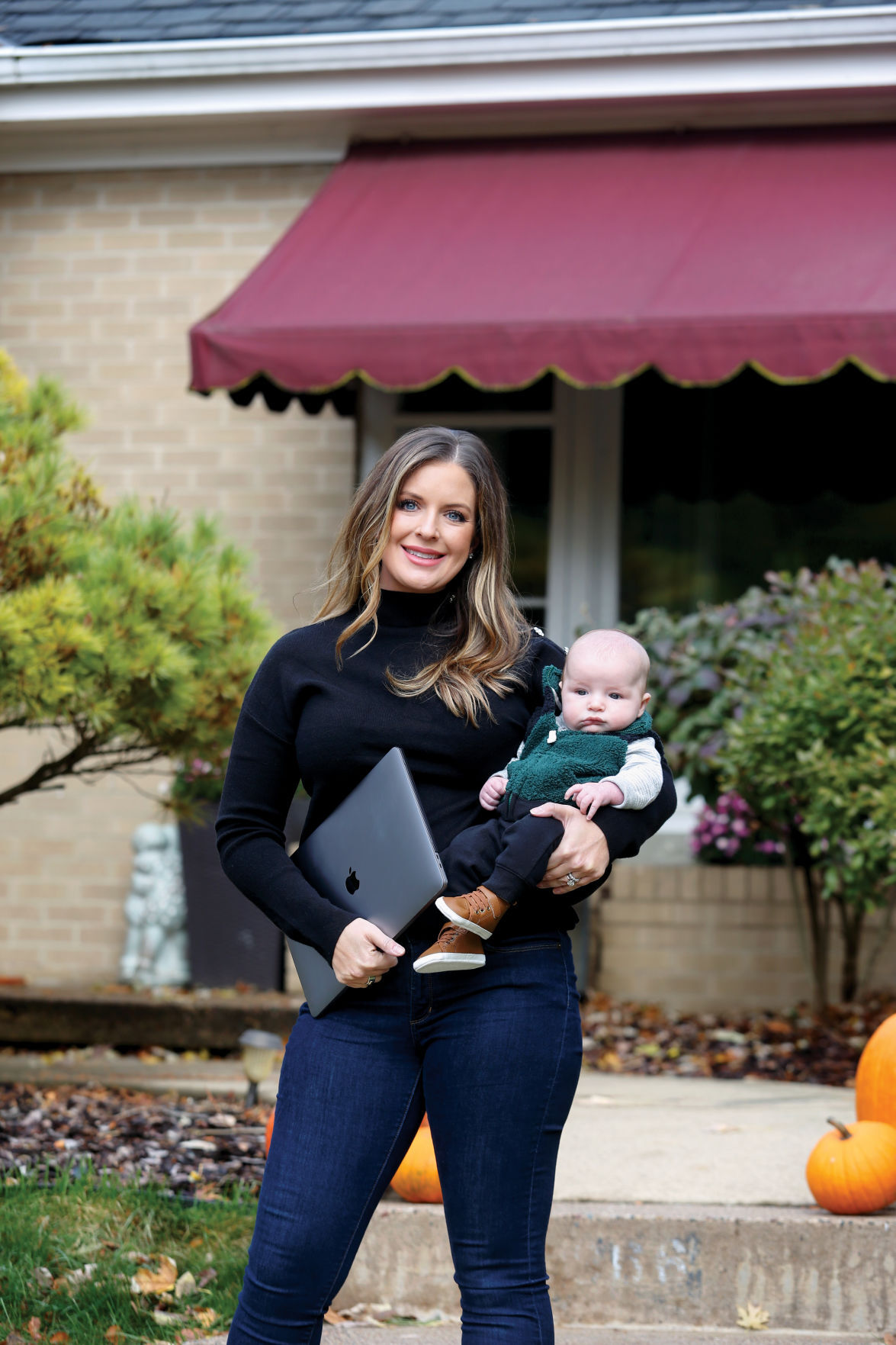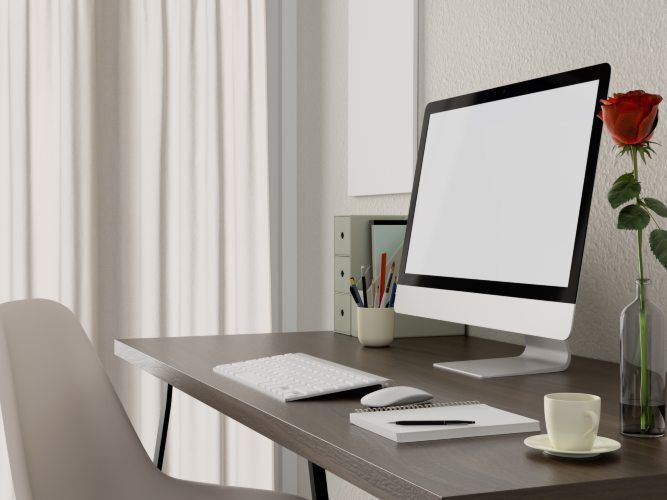Who knew that in March, when the COVID-19 pandemic hit, we’d still be working from home months later?
Originally we thought the situation was only going to be for a little while. But as the pandemic spread across the country once, then again, working from home is the best way to keep employees safe on the job.
Were workers prepared to suddenly work from home? Many scrambled to make office space in their apartments and homes. Parents carved out virtual school space for their children and a space for themselves to be productive at their job while working from home. Often, the kitchen or dining room table became the desk for parents and children.
A survey published on July 13 by Nulab asked 856 people who were working from home about their preparedness to work from home. Nulab creates software to improve team collaboration. About 29% of the respondents said they were working from an existing home office and about that same percentage was working from bedrooms. The survey found that desk workers were likely to be more productive than those working from other locations including a dining table, couch or bed.
The study also looked at remote productivity and found that 35% of respondents said they were more productive, 22% said their productivity remained consistent and about 43% said they became less productive.
The women who participated in the survey were more likely than men to feel less productive when working remotely. Since many COVID-19-related parental responsibilities such as homes schooling and day care often fall to women, there might be greater obstacles to productivity for women while working remotely. Men made up 55.7% of the respondents; women, 44.3%. The average age of respondents was 36.2 years old.
We checked in with some local work-from-home employees to find out if they are happier, what the positives and negatives are and if they feel their productivity has changed from when they are in the office.
Public defender sees increase in workload
Tom Goodman has worked as a public defender with the Dubuque Public Defender’s Office since 1997. He’s been a lawyer since 1982. He occasionally worked at home prior to the pandemic when he would bring files for a large case home to organize. Now, he has what he calls a “hybrid situation,” in which staff members take turns staffing the office on a daily basis to check voicemail and receive snail mail.
When the pandemic began, courts were shut down, and Goodman continued to work preparing cases for the eventual reopening.
“The crime rate was low in April and May because of the pandemic, but over the summer, it intensified. As people have been quarantined longer, cases of domestic violence and child abuse have increased substantially, and so has my caseload,” Goodman said.
At the end of May, the Iowa Supreme Court issued an order suspending all in-person oral arguments until July 13, and allowing appellate courts to conduct oral arguments through videoconference or phone through 2020.
Goodman said paperwork for court filings that would have taken 10 minutes prior to the pandemic now takes an hour because of additional forms required for videoconferencing.
“I’ve become more of a clerical than a lawyer because I don’t have the support staff at home as we did in the office. The secretarial staff is now doing extra data entry, updating calendars and other tasks which takes them away from helping to proof and edit forms that are completed by the public defenders.”
He credits the State of Iowa for doing a technology upgrade in 2019.
“If the pandemic had occurred last year, we all had desktop computers and we wouldn’t have been able to work from home. With the upgrade, we now have laptops with signing capabilities so that we can email documents to clients for their signature without having to snail mail the documents.”
Goodman says learning all of the different platforms for videoconferencing has been a challenge. And taking a deposition via teleconference isn’t the same as in person.
“It’s easy to miss the body language over the videoconference.” He’s happy that in-person depositions resumed in August.
He’s missing the camaraderie of the office staff, but says there is a good support network through the public defender’s office.
“There is sharing within the network of things others have learned, plus there are virtual education modules featuring renowned lawyers that I can watch at no cost.”
During his lunch break when in the office, Goodman walked to a nearby yoga studio to practice and relax.
“Now, at home when trying to do a down- facing dog, I could end up with an actual dog below me.” said Goodman, who owns three dogs.
Another disruption to working at home was that in his cul-de-sac, many of the neighbors were doing home renovations and large construction projects.
“There were dump trucks and lots of noise going on daily, which made it hard to focus.”
His wife is also working from home using the home office. Goodman is using the dining room table.
“There are boxes on the floor surrounding one end of the table, and I work at the other end. I brought all of my files home, and on days I work in the office, I tote needed files with me in a box or bag.”
More family time
Eva Schmid owns Lotus Marketing and counts Dubuque Regional Humane Society and Crescent Community Health Center among her clients. While she worked from home occasionally prior to the pandemic, she’s moved all business to her home office.
Eva and her husband Matt are new parents to son Bennett, who was born on July 16.
“I feel lucky that we are on a good sleep schedule both day and night with Bennett, which allows me to schedule my days a little easier,” Schmid said. “If I have a meeting on a day when our nanny isn’t here, I schedule it during Bennett’s nap time. I’m enjoying spending time with my baby and husband.
“I do miss spending time with clients. I got a Zoom subscription so that I could hold video calls, but it’s not quite the same,” Schmid said. “Another thing that I’ve noticed is that it’s easy to sit at the desk working for long periods of time and not get up to walk around.”
Matt began working from home in the guest bedroom that has been turned into an office.
A majority of respondents, 72.3%, to the Nulab survey said they were completely prepared to work remotely. Most already had a computer, a strong Internet connection and headphones. More than 50% of respondents had in-home printers and scanners. Office supplies including standing desks, back pillows and blue-light glasses were things that respondents said they wanted but didn’t have at home.
In the Nulab survey, 57% of respondents said their employer would not allow them to bring work-related equipment home with them, except for laptops and computers. Almost 32% of respondents said they spent their money to purchase necessary additional equipment with an average of $35 spent on these purchases.
Generous employer provides office equipment
Vernie Klein’s employer, Medline Industries Inc., has been generous in providing the needed equipment to ensure employees can do their job from home.
It supplied dual monitors, laptops, keyboards and a stipend for workers to buy a desk, printer and webcam, as well as a second stipend for internet usage.
“I was able to bring my sit-to-stand desk and office chair home along with other things including my nameplate to re-create my office at home,” Klein said.
Medline supplies medical products to hospitals, nursing homes, dental offices and clinics, as well as Walgreens, Walmart and the general public. Medline is on the frontline of personal protective equipment, which is needed in the 90 countries that Medline does business in to protect health care workers, essential employees and anyone who is at risk for contacting COVID-19.
In order to obtain PPE supplies, Medline flew planes to China to pick them up. They also converted a plant to produce hand sanitizer.
Klein has worked at Medline as a dedicated service representative taking orders for medical supplies for more than four years. About a year ago, Medline began a pilot project that allowed employees to work from home one or two days per week in order to prepare employees to work remotely in the event of a crisis or pandemic.
“I have an autoimmune disease, so working in a building with 500 employees isn’t feasible for me during the pandemic,” Klein said. “While it’s isolating to be away from co-workers and the camaraderie of being in the workplace, it’s better for my health to work from home.”
Klein said saving money on gas and wear and tear on the car and having free time during the lunch break was also an incentive for working at home. “Since I only have to walk out to my kitchen to prepare my lunch, I have time to clean my apartment, read a book, run errands, go for a walk and schedule appointments.”
Taking a scheduled break
Sara Albertsen is a lead-generation specialist at Cartegraph, a company based in Dubuque that provides asset management, work order management and space management software to governments, utilities, universities and commercial campuses.
She’s been with the company for one month, recently changing jobs from a different company in which she also worked at home because of the pandemic. Her job is to contact potential customers to explain ways that Cartegraph can assist their business.
Two of Albertsen’s three daughters attend virtual school in a dedicated workspace in the finished basement. Albertsen is working from her bedroom in space she carved out.
“I put a sign on my door that says, ‘When this door is closed, do not interrupt unless it’s an emergency,’ which helps to let my kids know when I’m not available,” Albertsen said.
As a new employee who started her job during the pandemic, Albertsen was virtually onboarded by Cartegraph Director of Marketing Kate Ernst.
“I want to make sure that Sara along with the other marketing employee that was onboarded during the pandemic feel like they are part of the team,” Ernst said.
Ernst said she holds virtual happy hours with her employees in addition to weekly one-on-one meetings. Albertsen mentioned Fika, something that Ernst began in the marketing department but will possibly roll out to all 130 employees.
Fika is a Swedish word that means “to have a break” and is a key part of Swedish culture. Ernst schedules a daily, 15-minute break at 2:30 p.m. on each of her employee’s calendars so that they can walk away from their work and recharge.
“It builds camaraderie and helps employees come back to work with a clearer mind,” Ernst said.
This practice continues during the pandemic while employees are working from home.
Ernest said productivity has remained the same or, in some cases, increased.
“Everyone is meeting their deadlines and achieving the goals that were set pre-pandemic. One other thing that the pandemic has changed is that there is much less traveling around the country for meetings, which helps with productivity, too.”
“It’s been fun getting to know employees on video calls, especially when a pet or child chimes in on the call,” Ernst said. “Or there might be a guitar hanging on the wall behind someone on the call and that encourages others on the call to ask about the person’s hobby to learn more about that person.”









